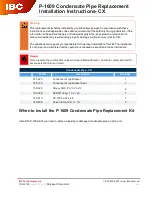
www.johnsonandstarley.co.uk
8
6.
PREPARATION & POSITIONING
6.1
PREPARATION
6.1.1 ELECTRICAL CONNECTIONS:
Make sure all the electrical cables are in place.
6.1.2 WATER CONNECTIONS:
Important. A minimum length of 1 metre of copper pipe MUST be fitted to both
flow and return connections from the boiler before connection to any plastic piping.
6.1.3 The central heating system should be in accordance with BS 6798 and for small bore and microbore
systems, BS 5449.
6.1.4
I
t is important that the system is flushed thoroughly before the appliance is left to operate (as recommended
in BS 7593) in order to maintain an efficiently operating heating system and in accordance with the
Benchmark Guidance Notes on Water Treatment in Central Heating Systems. See paragraph 15.10.
6.1.5 GAS CONNECTIONS:
Make sure the gas connections are in place.
6.1.6 Give consideration to the flue position. Pluming will occur at the terminal so terminal positions where this
could cause a nuisance should be avoided. See Figure 11.
6.1.7 Give consideration to the overall height. See section 7.
6.1.8 CONDENSE DRAIN:
This drain must be connected to a drainage point on site. All pipework and fittings in
the condensate drainage system MUST be made of plastic - no other materials may be used.
IMPORTANT:
Any external runs must be in accordance with BS 6798. The drain outlet on the boiler is
sized for standard 21.5mm (¾”) overflow pipe.
TABLE 3.
PERFORMANCE DATA
MAXIMUM
MINIMUM
Burner CO² (%)
case off
10.1
9.2
case on
9.7
9.5
± 0.5
Maximum gas rate
m
3
/h
1.17
PERFORMANCE DATA FOR CENTRAL HEATING
CH input Q
Net
kW
21.98
4.6
Gross
kW
23.86
4.93
Gas Consumption
m³/h
0.9
0.19
CH Output
Non condensing
kW
21.1
4.41
Condensing
kW
23.07
4.9
Seasonal Efficiency*
SEDBUK 2009
91.0
NOx Classification
CLASS 5 30mg/kWh
Central Heating set point temperature range
20 - 82°C
PERFORMANCE DATA FOR DOMESTIC HOT WATER
DHW Input Q
NET
kW
28.6
GROSS
kW
31.1
DHW output
kW
30.28
DHW flow rate at 35°C temperature rise
l/m
12.3
DHW specific rate
l/m
14.4
* The value is used in the UK Government’s Standard Assessment Procedure (SAP) for energy rating of dwellings.
The test data from which it has been calculated have been certified by a notified body.
Note. Gas consumption is calculated using a calorific value of 95.6 MJ/m³ gross or 88.0 MJ/m³ nett. To obtain the gas
consumption at a different calorific value:
a. For l/s - divide the gross heat input (kW) by the gross C.V. of the gas (MJ/m³)
b. For ft³/h - divide the gross heat input (Btu/h) by the gross C.V. of the gas (Btu/ft³)
c. For m³/h - multiply l/s by 3.6









































